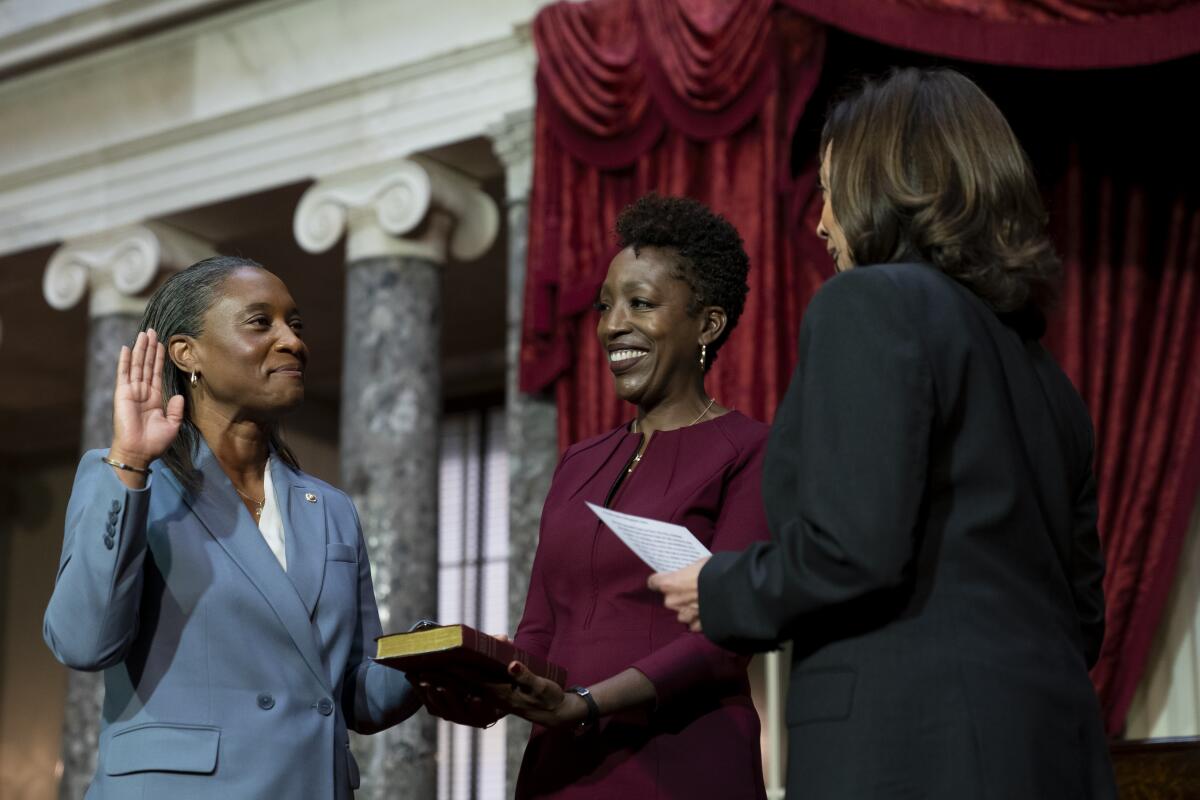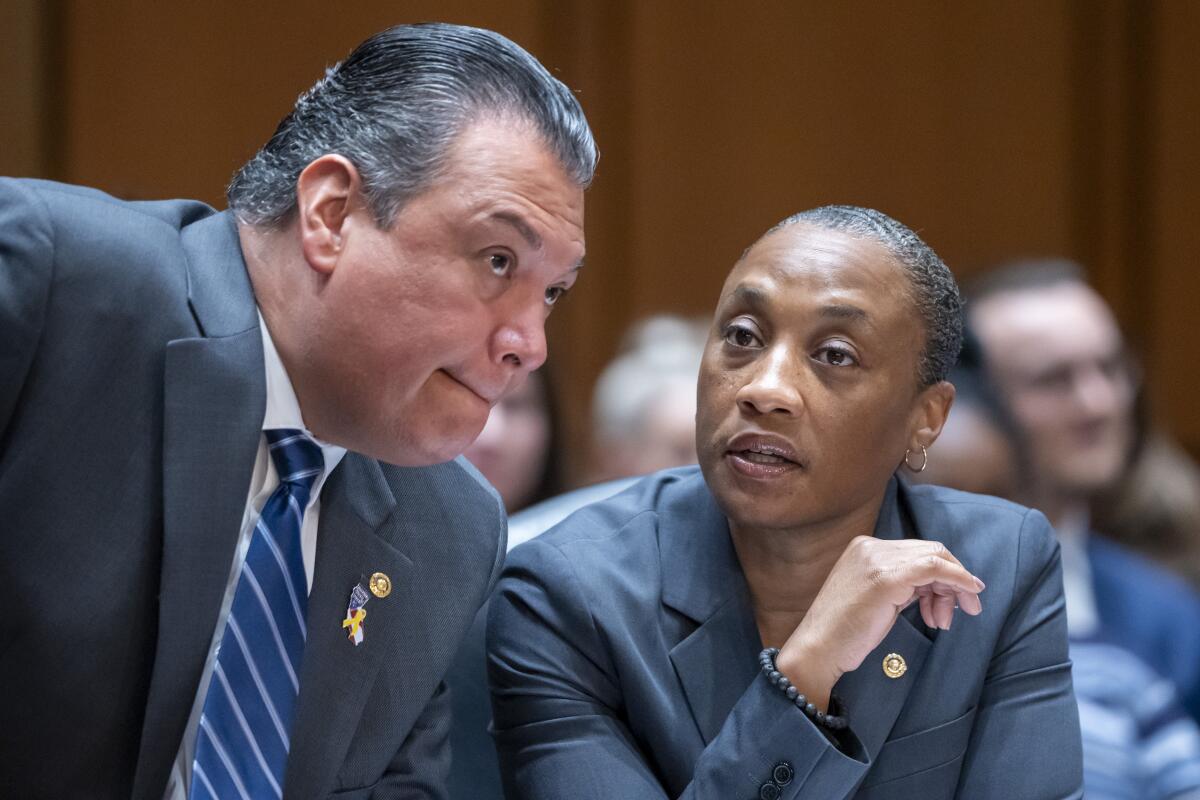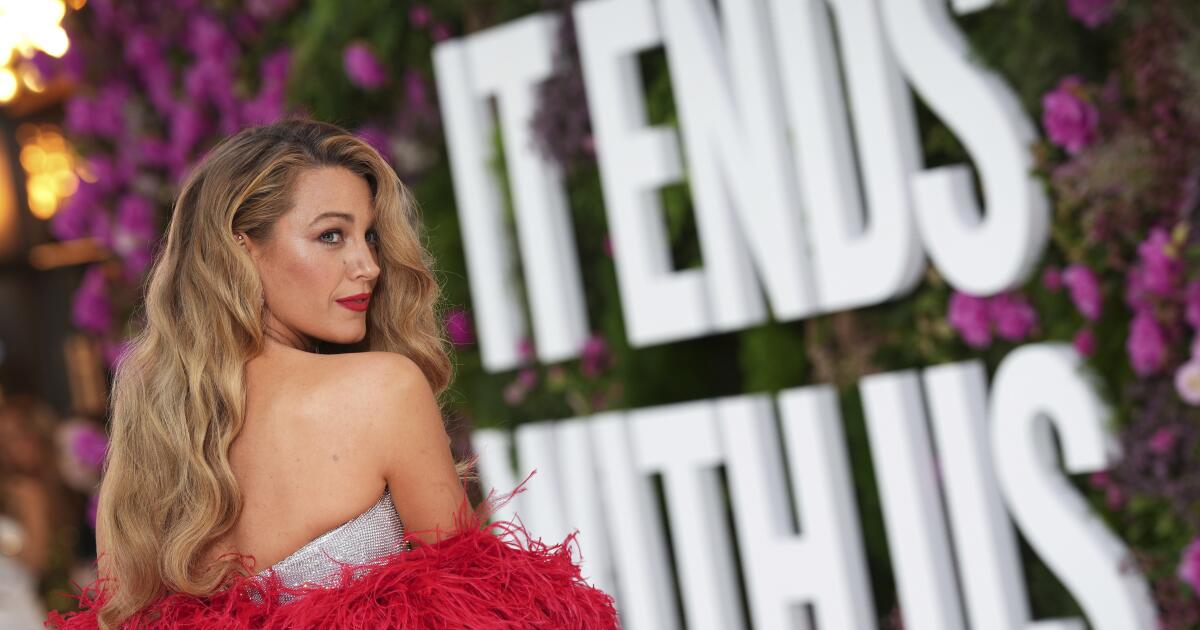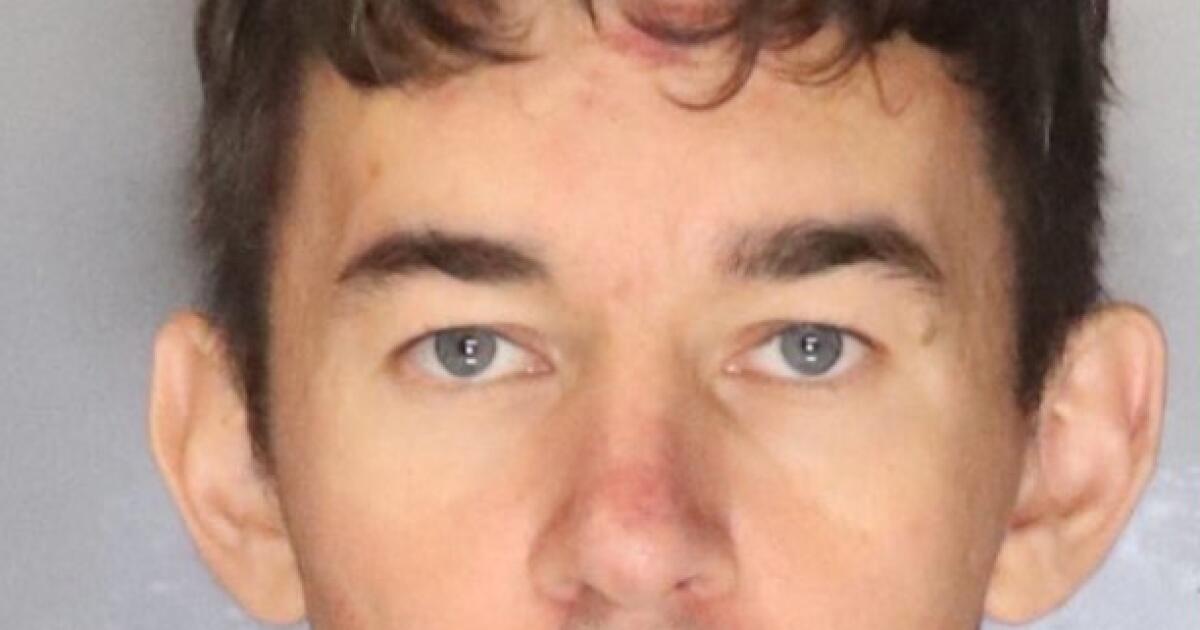WASHINGTON — Earlier this year, as Republicans sought to ban books with Black history and LGBTQ+ themes from schools across the country, the nation’s first openly gay Black senator stepped onto the Senate floor and read aloud from some of them.
“Perhaps for some of you here today, I am the face of one of your fears,” Democratic Sen. Laphonza Butler said in February, quoting 20th century poet Audre Lorde. “Because I am a Black woman, because I am a lesbian, because I am myself — a Black woman warrior poet doing work — who has come to ask you, are you doing yours?”
At the time, Butler was just a few months into her tenure as California’s junior senator, a 14-month stretch that began when she was appointed shortly after Sen. Dianne Feinstein died in 2023, and that ends Monday when Rep. Adam B. Schiff (D-Burbank) is sworn in to take her place.
The reading was part of Butler’s broader effort to put into the public record literature that’s becoming harder to access in conservative states. But it was also an expression of the identity that helped catapult her into the Senate after Gov. Gavin Newsom said in 2021 that he would appoint a Black woman to Feinstein’s seat should it ever become vacant.
As Butler — the third Black woman to serve in the Senate — leaves public office, the identity politics that were central to her rise are now under scrutiny by Democrats, who are working to understand their devastating losses in this year’s election. After a campaign in which Republicans ridiculed Vice President Kamala Harris as a “DEI hire” — a reference to diversity, equity and inclusion that suggested she was on the Democratic ticket due to her race and gender, former President Trump won in part because he gained support among Black and Latino voters.
“That’s the one thing she can’t choose, is that she is a Black woman,” Butler said, reflecting on Harris’ loss in an interview with The Times. She said chalking up the loss to only race and gender would be “intellectually dishonest,” but maintained that “those barriers, those challenges, those stereotypes and mindsets — they still persist, as much as we hope they don’t.”

Butler’s wife, Neneki Lee, holds the Bible as Vice President Kamala Harris swears in California’s junior U.S. senator in October 2023.
(Stephanie Scarbrough / Associated Press)
Butler began her time as a senator focused on youth development, voting rights and reproductive health, and spent the last few months trying to help Harris win the presidency.
The bond between the two dates back nearly 15 years, to when Harris was running for California attorney general and sought support from Butler, then the leader of Los Angeles’ service workers’ union. When Harris entered the 2020 Democratic presidential primary race, Butler became a top policy advisor to her campaign.
And when Harris stepped up as the Democratic presidential nominee this year, Butler again joined the team that was hoping to see her succeed. In numerous TV appearances, Butler defended Harris when pressed about her changing positions on issues such as unauthorized border crossings, when asked to comment on Trump’s personal attacks on Harris’ appearance, and when prompted for reasons to support the vice president’s bid for the White House.
Butler also spoke at the Democratic National Convention, telling the crowd that when her daughter heard that their friend Kamala was running for president, she asked whether she could be vice president.
“We both graduated from historically Black colleges. … We were both raised by mothers who worked fiercely to provide for us, and we both believe that every single one of us has the power to change the world when we choose to do it together,” Butler said.
Before joining the Senate, Butler was a political operative known for her effective behind-the-scenes organizing. She served as president of EMILYs List, an organization that works to elect Democratic women who support abortion rights; was a partner at the powerful political consulting firm that has represented Harris and Newsom; and spent years as the head of Service Employees International Union Local 15, which represents caregivers and others in the service industry in California.

Gov. Gavin Newsom, with Butler at an L.A. school event after her swearing-in, stirred controversy when he appointed her to the late Sen. Dianne Feinstein’s seat in 2023.
(Mel Melcon / Los Angeles Times)
While historic, her appointment also drew some criticism. Republicans took issue with Newsom choosing someone who wasn’t living in California — Butler is a longtime California homeowner but had moved with her wife and daughter to Maryland while running EMILYs List.
Some Democrats were dismayed that Newsom did not choose Rep. Barbara Lee (D-Oakland), who was actively running for Senate at the time Feinstein died. Lee’s supporters saw her as the most-qualified candidate due to her decades of experience in Congress. In a letter urging Newsom to pick Lee, the Congressional Black Caucus said that “she is the only person with the courage, the vision, and the record to eradicate poverty, face down the fossil fuel industry, defend our democracy, and tirelessly advance the progressive agenda.”
Newsom said he didn’t want to tip the scales in the competitive primary for Feinstein’s seat. But James Taylor, a professor of political science and African American studies at the University of San Francisco, said Newsom’s choice may have been driven by conflict among California Democrats over voters seeing them as too liberal. Lee has been outspoken in condemning Israel for the war in the Gaza Strip, for example.
“Butler allowed herself to be used,” Taylor said. “If Gavin Newsom wanted to honor Black California women, he should’ve appointed Lee or [Los Angeles Rep. Maxine] Waters. He went out of his way to not give Lee that honor.”

Butler speaks with mentor Alex Padilla, California’s senior U.S. senator, during a Senate Judiciary Committee meeting.
(Alex Brandon / Associated Press)
Congress, and particularly the Senate, is known to move slowly. Partisanship can take over and compromise can require repeated conversations to reach. It’s especially hard for a short-timer with no seniority.
Butler focused her time on building relationships with colleagues and uplifting the causes she has championed throughout her career. She formed a youth advisory council, held field hearings on voting rights and worked to secure confirmation of federal judges in California. She introduced 33 bills, including legislation to address the behavioral health needs of adolescents, secure federal voting rights for people released from prison and limit the separation of migrant families detained near the border.
Sen. Alex Padilla, Butler’s closest colleague as California’s senior senator, said he expects that they will continue to collaborate no matter what she does next. While the two California senators mostly agreed, they split on at least one high-profile issue: a bipartisan border security bill that failed early this year at Trump’s urging.
Most Democrats, including Butler, initially voted in favor of the bill, which included significant provisions to tighten border security but no pathway to citizenship for immigrants in the country illegally. Padilla urged his fellow senators to vote against it because it failed to provide solutions for undocumented immigrants.
One of their final acts as colleagues on the Senate Judiciary Committee was securing the confirmation of Judge Anne Hwang to the U.S. District Court for the Central District of California — making her the first Korean American to serve as a federal judge in that district.
Padilla recalled calling or texting Butler daily when she first joined the Senate.
“She made me laugh a couple months in when I stopped checking in as frequently,” he said. “She asked me, ‘What happened to my morning texts?’ I said, ‘You’re doing more than fine. The training wheels have come off. It’s time for you to ride.’”
Butler said being a senator felt much like being an organizer — it was about forming tactical and strategic relationships, and finding common ground. She took her activist roots, where her job was “to push and challenge and make something happen,” to a body that she said “does today exactly what it was designed to do 248 years ago — nothing fast.”
She said she focused on working with colleagues across the aisle for legislative victories despite her personal opposition to their political perspectives.

Butler with state party Chair Rusty Hicks during a gathering of California’s delegation to the Democratic National Convention in Chicago this summer.
(Myung J. Chun / Los Angeles Times)
“I’m not there to get married. We’re not even dating,” Butler said. “This is a transaction, and no one should think anything different than that.”
She said she secured the vote of Sen. Susan Collins (R-Maine) for one of the judges she wanted to see confirmed. She and Sen. Charles E. Grassley (R-Iowa) introduced legislation aimed at preventing youth opioid use and overdoses. And she introduced a bill with Sen. Katie Britt (R-Ala.) to fund maternal mortality research, money she hoped to secure this month through the National Defense Authorization Act.
“That kind of approach to problem-solving is something that we could all learn from,” Sen. Tina Smith (D-Minn.) said Thursday on the Senate floor.
“I’ve watched you in the short time that you’ve been in the Senate — only 14 months — which, in the life of many senators, is barely a blink of an eye,” Smith said in comments directed at Butler. “And I’ve watched you figure out how to organize in this chamber for the good of the people that you represent.”
For her part, Butler has shot down any notion of further public office. She said she didn’t fall in love with the process of being a legislator or the trappings of believing she was some kind of celebrity.
Even so, she she beamed with pride as she took to the Senate floor on Thursday, not to read a banned book but to bid farewell with a speech that invoked the first and second Black female senators who preceded her in office.
“It’s been a remarkable honor — a completely unimagined adventure to follow in the footsteps of Dianne Feinstein, who so ably served in this chamber for more than 30 years, and to be blessed to walk the same hallways as Sen. Carol Moseley Braun and share the same office space as Vice President Kamala Harris,” Butler said in her final remarks from the floor. “I can only hope that for the people of California … I was able to do half as well as those who came before me.”








Leave a Reply